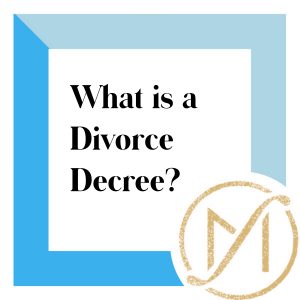What Is a Divorce Decree?

You may have heard the term “divorce decree” and wondered exactly what it is? Read on to learn more about divorce decrees — including what they are, how they work, and how to get a copy of one.
What is in a Divorce Decree?
A divorce decree ends a marriage. A judge issues a divorce decree as the final order in a divorce case. In an uncontested divorce, the final divorce order will likely largely reflect the agreement that you and your spouse reached. Any divorce in Connecticut that results in a full final agreement is eligible for an uncontested hearing. A mediated divorce, a collaborative divorce, and even most litigated divorces all wind up in an uncontested hearing. The only divorces that don’t are divorces that go all the way to a divorce trial.
Alternatively, if yours was a high-conflict divorce that results in a trial, the divorce decree will reflect the Judge’s rulings.
Finally, the divorce decree, also known as the judgment of dissolution or divorce order, addresses all of the issues in the divorce. In addition, it returns the spouses to the legal status of single and unmarried.
What Does a Divorce Decree Cover?
The divorce orders will address everything Connecticut requires that the Court decide in a divorce.
These include:
And if you have children, also includes:
What if I Want to Change My Final Divorce Orders?
But sometimes, as your life and your children’s lives change, you may need to make some adjustments to your divorce decree.
A myriad of issues can come up after a divorce is finalized, but some are more common than others. If you need to file a Post Judgment motion, it’s often because:
- One parent wants to relocate.
- Your former spouse’s remarriage or cohabitation with a new partner.
- One ex-spouse’s income increases or decreases significantly.
- You or your ex disagrees with the court order.
- New information comes to light post-divorce
What if My Ex Isn’t Following our Divorce Decree?
When a spouse doesn’t follow the divorce orders, they may be in contempt of court.
- A parent doesn’t pay child support.
- An ex-spouse disobeys the divorce order and doesn’t pay alimony.
- An ex-spouse doesn’t transfer retirement funds or other property as required.
Are Connecticut Divorce Records Public Information?
Like marriage records, Connecticut divorce records are public records. They are available to anyone 18 years of age or older. That said, there are also restrictions on what information is provided to the public. For example, details of property inventories, financial affidavits, financial settlements, and bank accounts are generally restricted to the spouses and their attorneys.
Are Divorce Decrees Available Online?
No. While you can look up most family law cases on the Connecticut Judicial Branch’s website, and see some items on the docket (including whether a divorce was granted) you cannot click through to see the contents of pleadings, motions, or orders, etc.
Where Do I Get a Copy of My Divorce Decree?
To obtain a copy of your Divorce Decree, you request it from the Connecticut Superior Court that granted your divorce. If you would like to get it yourself, here is a Directory of Connecticut Superior Courts. Alternatively, your divorce lawyer can assist you.
Next Steps
Our first step at Freed Marcroft, the Goals & Planning Conference, is designed to get to the heart of your problem and unveil your true goals for your life. Once we discover your goals, we are able to take our experience and build an approach customized for you.








